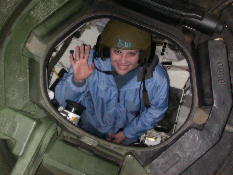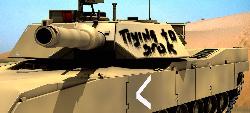August 11, 2012
I thought about how many units this has happened to. The willfully ignorant -- purposefully ignorant -- commander comes into an area, tells the "elders" to forget how things were done under the old unit and that this time, this time I will fix things. And we will have cooperation and harmony and win your hearts and minds. So we use whoever we can get to translate important policies -- my husband made the analogy that it would be like if the Germans invaded backwater Alabama and used Quebecois translators to talk to the natives --and hope that our message is being accurately conveyed. Which it's absolutely not, because there is way too much cultural baggage that gets in the way of the words. So some of them die, and some of us die, a year later the remaining guys breathe a sigh of relief and go home, and a new group of guys shows up, tells the "elders" to forget how things were done last year, and this year, this year it will work.
Posted by: Sarah at
09:57 AM
| Comments (5)
| Add Comment
Post contains 511 words, total size 3 kb.
Posted by: Jenn at August 11, 2012 12:45 PM (LHZib)
Posted by: Amritas at August 11, 2012 01:34 PM (/MyR6)
For a decade, we have been reinventing the wheel.
For lots longer than that. The period 1965-73 comes to mind.
Posted by: Glenmore at August 21, 2012 12:11 PM (h/mwe)
The likelihood of success never had anything to do with the nobility of the undertaking. On a national policy level, if ever we had such a thing, we have no chance to succeed in Afghanistan and we never did.
But we can and do have small victories, and we find what nobility we can in a Sisyphean task well-executed.
I wouldn't feel much different deploying there now than I did in 2005--my task is to take care of my people, and lead them in trying to do a thing that can't be done. We will succeed within the sphere of our influence; it's just a much smaller sphere than we'd like to believe. That's as true for nations as it is for five-man teams.
Posted by: Sig at August 21, 2012 09:28 PM (DfX6p)
Glenmore,
American history didn't begin with the Vietnam War.
Sarah,
I get where you're coming from, but the reason I can't think this way about it is because I served in Korea. Not in the war, of course, but standing where they stood with the hindsight view of the war 50 years later.
I spent time with Korean War veterans and know they, too, felt "jaded and broken" from their experience. I know enough of the war's history to know that many of our Korean War veterans and Americans in general felt, at the time, that Korea "was not worth it" and the "task was monumentally too difficult to ever succeed".
While north Korea continues to be a testament to what we failed to achieve now-60 years ago, South Korea is a testament to what our sacrifices and commitment did help achieve. The South Korea at the time that hostilities were suspended was radically different than the South Korea of today. The likelihood that South Korea would stand up as it has seemed unlikely when the war ended.
Of course, comparing the South Korea of today to the Korea of 60 years ago can't guarantee the same positive development for Iraq and Afghanistan, but it does remind us that changing the course of a country doesn't bear fruit right away. It may take a lifetime.
Posted by: Eric at March 19, 2013 05:14 AM (4yRgM)
48 queries taking 0.0746 seconds, 174 records returned.
Powered by Minx 1.1.6c-pink.














